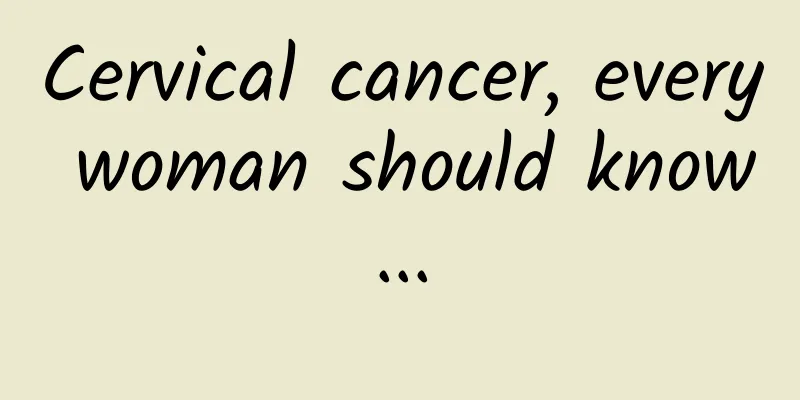Cervical cancer, every woman should know...

|
When it comes to cervical cancer, people used to think of Anita Mui. Every flower withers for a reason and a sign. Cervical cancer is a disease caused by infection, so it can be prevented. When it comes to infection, we have to talk about cervical erosion. Let's first correctly understand cervical erosion. "Cervical erosion" is a name that has withdrawn from the stage of history. The reason why everyone is "familiar" is due to the influence of advertisements and private clinics. Many women go to the hospital for a gynecological examination and ask the doctor worriedly: "Do you have cervical erosion?" In fact, is cervical erosion a disease? Cervical erosion is ectopic cervical columnar epithelium, which can be physiological or pathological. There is a huge difference between cervical erosion and cervical cancer. It is not the consequence of "private life erosion" and will not be transmitted to the partner. When you are told that you have "cervical erosion", you should undergo liquid-based cell examination and HPV examination, and colposcopy or biopsy if necessary. If you have cervical erosion, don't blindly treat it. If there are no symptoms, you only need to screen regularly. If there are symptoms, you need to consider physical therapy, and you need to go to a regular hospital for treatment. Let's get to know cervical precancerous lesions and cervical cancer. Cervical cancer is a malignant tumor that occurs in the cervical epithelium. Its early manifestations may be irregular bleeding and pain. Just as influenza has influenza viruses, cervical cancer also has cervical cancer viruses. Its scientific name is "human papillomavirus", or HPV. HPV is a large family with more than 200 types. It is divided into the eldest family - high-risk type and the second family - low-risk type. The eldest family has more than a dozen people, including 16, 18, 31, 33, 35, 39, 45, 51, 52, 53, 56, 58, 59, 68, etc. The second family has 6, 11, etc. Under what circumstances will members of this family come to visit? Generally, when the host's immunity is low, they will take advantage of the opportunity to enter when "applauding for love". When infected with HPV, we say it comes to "visit" because it will mostly disappear on its own, that is, when your immunity is good, it will feel that your body is rejecting it and does not welcome it, so it will quietly leave. Some will continue to be infected and live peacefully in the body, or they will develop into precancerous lesions or even cervical cancer. Precancerous lesions will not develop into cervical cancer as long as they are treated properly. If precancerous lesions are not treated, they may develop into cervical cancer. Can cervical cancer be detected in its early stages? The answer is yes! There may be no symptoms in early cervical cancer, but there are some clues. Many communities offer free screening for "two cancers" every year. One of these "two cancers" is cervical cancer. For women who have sex, HPV and TCT screening can detect cervical precancerous lesions early so that corresponding treatment can be given, such as colposcopy, cervical biopsy, cervical conization, etc. There are also vaccines for preventing HPV, which can effectively prevent HPV infection. There are currently three types of HPV vaccines on the market: bivalent, quadrivalent and nonavalent. What is the difference between the three? Bivalent refers to types 16 and 18, which are the two main members of the high-risk type (old family) mentioned above. Most cervical cancers are infected with these two types. Quadrivalent is based on the bivalent plus two low-risk members 6 and 11. Nine-valent is based on the quadrivalent plus five high-risk members 31, 33, 45, 52, and 58. So is the higher the price-effectiveness, the better? Not really. You can choose to inject according to the corresponding age. Bivalent and quadrivalent are suitable for 9-45 years old, and nine-valent is suitable for 16-26 years old. Of course, if you are over 26 years old and can't buy bivalent or quadrivalent HPV vaccines, you can also choose nine-valent vaccines. It should be noted that women who do not have sex can be vaccinated with HPV vaccines, and the effect is better. However, pregnant women are not recommended to be vaccinated with HPV vaccines. However, if you become pregnant during the vaccination period, there is no need to have an abortion, just interrupt or postpone the unfinished vaccination. Also, it is not recommended to get the HPV vaccine during breastfeeding, but it will not affect the menstrual period. The most common adverse reaction after the HPV vaccine is pain at the injection site, and other adverse reactions are rare. It should be noted that after the HPV vaccine is injected, regular cervical cancer checks are still required. Because HPV is a large family, the vaccine does not prevent cervical cancer 100%. In short, cervical cancer is preventable and curable. To stay away from cervical cancer, starting from the cause, standardized examination, early injection of HPV vaccine, and standardized treatment of precancerous lesions are the key. |
<<: The first-person perspective brings you an immersive experience of normal childbirth
Recommend
Hard pimples on the skin of genitals
The female genitals are very important to women, ...
National Eye Care Day - Pharmacists show you the symptoms and drug treatment of dry eyes
June 6, 2024 will be the 29th National Eye Care D...
How to reduce swelling and pain in gums during pregnancy?
People often say that when a woman gives birth to...
What causes uneven endometrial echo?
The endometrium is the place where life is nurtur...
How long will it take for the pain to come?
Pregnancy is a very difficult thing for a woman, ...
What medicine should women take for night sweats
Night sweats are actually an abnormal sweating co...
Can I eat bananas during my period?
We all know that female friends should make good ...
What is the cause of right kidney pain in women?
Today we are going to talk about the causes of ri...
Is 2.1cm of pelvic fluid serious?
Pelvic effusion is a common symptom that occurs i...
Treatment for brown discharge before menstruation
The incidence of menstrual problems cannot be und...
Brown discharge in the eighth month of pregnancy
Brown discharge in late pregnancy is actually a r...
Why did the emperors in ancient times offer sacrifices to heaven on Mount Tai? How many temples are there on Mount Tai?
Mount Tai is famous for its magnificent scenery. ...
Pregnant woman's stomach pain gets better after farting
Some pregnant women find themselves experiencing ...
Is it okay to eat black wolfberry during breastfeeding?
There are many things to pay attention to in diet...









